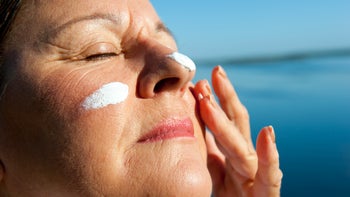
What Is Face Toner and Is It Good for Your Skin Type? Here’s What You Need to Know
Key takeaways:
Toner is usually the second step in a skin care routine. You apply it after cleansing and before other products, like serums and moisturizer.
Face toners may help balance the skin’s pH and prepare it to better absorb other skin care products.
Toner can also contain ingredients to address skin concerns like acne and sensitive skin.

Face toners have been around for years. But many people are still not sure what exactly a toner is and whether it’s good for their skin.
Toners were once known for removing dead skin cells and causing skin dryness. But nowadays there are many kinds of toners available to address a variety of skin issues. From salicylic acid to anti-aging ingredients, facial toners contain a wide variety of ingredients. And many feel it’s an essential step in their skin care routine.
Is facial toner good for your face?
It can be. It depends on your skin care goals and what’s in your toner.
Search and compare options
Facial toner is a liquid that’s applied to the face, usually with a cotton ball or pad, after cleansing. Toner can help balance your skin’s pH. This can make it easier for other skin care products, like serums or moisturizers, to soak into your skin. In short, toner may help your other skin care products work better.
Toner can also contain ingredients that address specific skin concerns. For example, some toners contain salicylic acid that can help with acne-prone skin. Others contain popular ingredients like hyaluronic acid, glycolic acid, or niacinamide. So toners can offer an extra layer of treatment to address specific skin concerns.
But you also want to make sure that a toner doesn’t contain ingredients that can dry and irritate your skin, like alcohol and fragrances. People with sensitive skin or certain skin conditions are more likely to have a reaction to these ingredients.
You also have to decide whether you want to add another step to your skin care routine. Some people believe toner is worth the added effort, time, and cost. But for others, toner just isn’t worth the hassle. Currently, there’s no evidence that you need to use toner for healthy skin. So whether you add toner to your routine really comes down to your personal preference.
Do dermatologists recommend toner?
“For many people, toners can be a helpful addition to their skin care routine, and they can even help address specific concerns,” said Maria Robinson, MD, board-certified dermatologist and GoodRx freelance editor.
“When it comes to toners, the key is finding the right one,” Dr. Robinson said. “For acne-prone skin, toners with salicylic acid or alpha hydroxy acids can help prevent breakouts. For dry or dull skin, hydrating toners with glycerin, hyaluronic acid, and ceramides can lock in moisture and help restore the skin barrier.”
Read more like this
Explore these related articles, suggested for readers like you.
Should everyone use facial toner?
Facial toner may not be right for everyone. You may want to avoid toner if you have very dry skin, sensitive skin, or rosacea. Some toners contain azelaic acid and alcohol. While these ingredients can be great for some skin types, they can irritate sensitive and dry skin.
Dr. Robinson’s general recommendation is that people with sensitive or dry skin avoid alcohol-based toners because their skin can get irritated. “On the other hand, if you have oily skin, some alcohol in the toner can be helpful in cutting through the extra oil,” she said.
There are alcohol-free toners on the market. But it’s a good idea to always double-check the ingredients label even if the product claims to be alcohol-free.
How to use facial toner
Toner can be used both morning and night, although many choose to use it mainly at night as an additional step to pick up dirt, oil, or makeup that was left behind on the skin after washing.
To apply toner, saturate a cotton ball with the liquid toner and gently sweep it over your face. Avoid the area around your eyes and wash your eyes out completely if any toner accidentally gets into your eye.
Don’t wash the toner off after application. You want to let your skin absorb the ingredients in your toner. Let the toner dry and then move on to the next step in your skin care routine, whether that’s serums or moisturizer.
How often you use a facial toner can vary, depending on your skin’s response.
“People with combination or oily skin may be able to use a toner once or twice a day. But those with dry or sensitive skin may only be able to use it every other day,” Dr. Robinson said.
“Start slowly and listen to your skin. If you have signs of irritation, like red or scaly skin, you may need to switch toners or use it less frequently,” Dr. Robinson advised.
The bottom line
Facial toners have come a long way. For many people, toners are a regular step in their skin care routine. Some find it an essential step to be done twice daily, while others apply it once every other day. Facial toners can help prepare your face for serum and moisturizer, and help deliver ingredients to address your specific skin concerns.
Why trust our experts?


References
Draelos Z. D. (2018). Are facial toners necessary? Dermatology Times.
Draelos Z. D. (2019). Cosmeceuticals: What's real, what's not. Dermatologic Clinics.
Draelos Z. D. (2022). Focusing on toners and astringents. Dermatology Times.




























